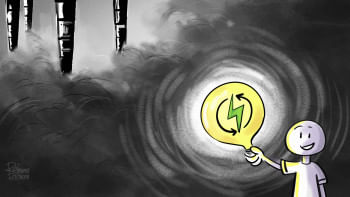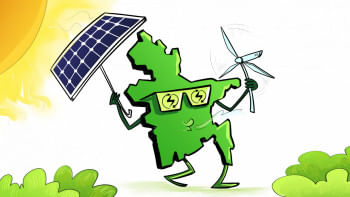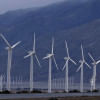Why the reluctance to pursue renewables?

Despite Bangladesh's professed commitments towards the environment and its role as a climate champion on the global stage, it is deplorable that the government has continued to focus heavily on fossil fuels, ignoring much needed investments in renewables. The renewable energy capacity target for 2030 was set at 6,000MW-16,000MW in the Mujib Climate Prosperity Plan 2022-2041, submitted at COP26, but the country has only added about 462MW of renewable energy to the national grid since 2017, when the first solar power plant was established. There are currently only 10 solar plants in operation, while two wind power plants have started trial runs. According to a report in this daily, another 15 plants are expected to go into production within the next year. But even then, their combined capacity will constitute only 4 percent of the total power mix in 2025. This is woefully inadequate.
In 2016, the government had aimed to meet 10 percent of its energy needs through renewables by 2021, but since then it has not taken any visible steps to address the glaring gap in its clean energy target, beyond revising it multiple times in different policies and plans. Multiple studies have busted a myth often touted by government officials—that there is land scarcity in the country—and shown that there is more than adequate khas land to generate at least 2,15,011MW of solar energy.
We are at a loss to understand why our policymakers were so reluctant to pursue the obvious path of sustainable, cheap and clean energy when the whole world, including two of its trusted regional partners—India and China—have taken dramatic leaps towards that end. While China is now the global leader in renewables, India has targeted to achieve half of its energy from renewables by 2030. The two giants have provided various incentives, such as cash grants and tax credits, but in Bangladesh, businesses have to pay 37-56 percent tax to set up renewable plants, according to experts.
The country's prolonged energy crisis over the past two years—brought about by its overdependence on expensive imported fossil fuel—should have been a wake-up call to the government to explore more sustainable options; yet, we continue to see the same short-sighted policies being pursued by our policymakers, with little concern about the long-term implications of failing to invest in renewables, which are not only sustainable but also cost-effective. It is imperative that the government, in consultation with relevant stakeholders, overhaul its existing energy strategy if it is to meet its target of achieving 40 percent clean energy by 2040. We need to encourage investments in renewables, formulate relevant policies and develop local capacity to apply renewable technologies. We also need transparent and competitive bids while awarding contracts, so that we don't continue to pay Tk 16-17 per kilowatts of solar electricity when the global average is Tk 5.


 For all latest news, follow The Daily Star's Google News channel.
For all latest news, follow The Daily Star's Google News channel. 









Comments